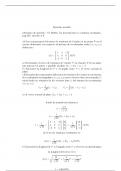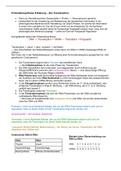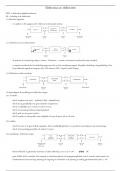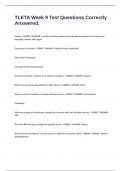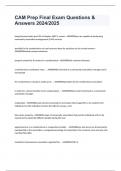pagina 1
lecture 1 - introduction
1. importance
• no politics without persuasion
‣ uncertainty about the best means to an ends and about the goal
• big di erence between persuasion by speech and persuasion by force
‣ persuasion is a symbolic process in which communicators try to convince
other people to change their own attitudes or behaviours regarding an issue
through the transmission of a message in an atmosphere of free choice
- democracy is distinguished as a form of governance by the extent of
persuasion relative to coercion
2. what is rhetoric?
• studying rhetoric is learning the practical skill of persuasion, and studying the
persuasiveness of speech
• not limited to spoken word
‣ written word and visuals
a. what is political rhetoric?
• persuasion in the political realm
‣ not limited to politicians
i. diverse research eld
• di erent backgrounds, di erent questions
‣ each with their own terminology and research methods
b. a contested notion
• words often associated with rhetoric are mere and empty
‣ rhetoric is contrasted with reality
• association with danger
‣ can people be persuaded of anything?
- violence, misinformation
• at the same time: no democracy without free speech / rhetoric
3. history
a. greece - 500 BC
• from aristocracy to democracy
‣ assembly in which citizens decide together
- highly participatory system
• status of being citizen comes with obligations
‣ expected from every citizen that they speak well
- rhetorical skills were important
• teachers: sophists
• culture of oral transmission
ff ff fi ff
, pagina 2
i. plato
• rhetoric is empty and dangerous
‣ can do bad instead of good (death of his mentor socrates decided in
assembly)
- it can persuade most people of anything: a rudderless boat
- sophistries = long arguments that trick someone into believing something
wrong
• belief in one moral truth
‣ allegory of the cave
- only a small elite can see it
• the republic
‣ society should be based on reason
‣ strict division: philosopher - kings, guardians and traders
• ideas were later criticised
‣ popper: argument for alternative type of rhetoric
- dialectic = be persuaded by each other to come to the best solution
together
ii. aristotle
• more positive reading of rhetoric
‣ rhetoric complements philosophical reasoning
- man is a political animal
good life is in accordance with community
• how should the best case be put, given the argument, evidence, audience?
‣ best case is not always clear
• the art of rhetoric
• disclaimer: exclusive notion of citizen
‣ importance of enthymeme
- cut certain steps of the arguments
assume that audience shares ideas
‣ degree of permitted disagreement is limited
iii. cicero
• treatises on rhetoric
• refuted sophism
‣ understanding of topic comes rst; then follows good speech
- truth that comes rst
‣ was pragmatic
• persuasion is not about techniques but about the talent to adapt
‣ adapt to topic audience and speaker
fi fi
, pagina 3
b. emergence of modern state
• centralised, powerful authorities
‣ laws to be obeyed without discussion
- monopoly of violence
subordination of citizen assemblies to rules
i. hobbes - leviathan
• pessimist about nature of human beings: uncertainty & competition driven by
passion/appetite
‣ capable of reasoning (not like animals)
- but di erent interpretations of the same event
no shared morality
• rhetoric leads to even more confusion
‣ e.g. metaphors
• rational thing to do: one-time “social contract”
‣ appoint supreme power to bring civil piece
- state needs to draft lines on what citizens can do
ii. rousseau - social contract
• humans are naturally good
‣ modern society made them sel sh
• return to harmony through agreement among citizens
‣ state is not a distant leviathan
- no external authority
‣ collective citizen body remains in charge
• obey the general will (internal motivation)
‣ not developed through rhetoric
- long debates bespeak the assendance of particular interests and the
decline of the state
‣ persuasion is essentially non-argumentative
- appeals to individual’s conscience
• need for unanimity: small & highly exclusive state
‣ people identify with each other
- shared sentiment from within
ff fi
, pagina 4
4. politics versus political
• argument of james martin
• politics = regular activities taking place within the rules of the game
• the political = higher principles (what are the rules of the game?)
‣ only partially settled
- realisation that things might be done di erently
- power relations can always change
• potential for chaos, disorder, crisis
‣ dismissal of rhetoric is a symptom of that concern
- rhetoric involves both politics & the political
just rhetoric: mundane day-to-day-business
speeches that changed the world: e orts to establish new principles
• if thinker has sympathy for rhetoric, there are often limits (e.g. very exclusive
public sphere) to eliminate discussion about the political
5. situating rhetoric
a. language
• not all rhetoric is language
• not all language is rhetoric
b. ideology
• organised belief system (e.g. liberalism, communism)
‣ but rhetoric is about assembly / construction of ideas (and delivery)
• ideology is a resource for rhetoric
‣ rhetoric can change (or create) ideologies
c. discourse
• how people make meaning of things
‣ deals with persuasion and power (cf. critical discourse analysis)
• discourse is broad and ongoing
‣ rhetoric concentrates on situated encounters
ff ff
lecture 1 - introduction
1. importance
• no politics without persuasion
‣ uncertainty about the best means to an ends and about the goal
• big di erence between persuasion by speech and persuasion by force
‣ persuasion is a symbolic process in which communicators try to convince
other people to change their own attitudes or behaviours regarding an issue
through the transmission of a message in an atmosphere of free choice
- democracy is distinguished as a form of governance by the extent of
persuasion relative to coercion
2. what is rhetoric?
• studying rhetoric is learning the practical skill of persuasion, and studying the
persuasiveness of speech
• not limited to spoken word
‣ written word and visuals
a. what is political rhetoric?
• persuasion in the political realm
‣ not limited to politicians
i. diverse research eld
• di erent backgrounds, di erent questions
‣ each with their own terminology and research methods
b. a contested notion
• words often associated with rhetoric are mere and empty
‣ rhetoric is contrasted with reality
• association with danger
‣ can people be persuaded of anything?
- violence, misinformation
• at the same time: no democracy without free speech / rhetoric
3. history
a. greece - 500 BC
• from aristocracy to democracy
‣ assembly in which citizens decide together
- highly participatory system
• status of being citizen comes with obligations
‣ expected from every citizen that they speak well
- rhetorical skills were important
• teachers: sophists
• culture of oral transmission
ff ff fi ff
, pagina 2
i. plato
• rhetoric is empty and dangerous
‣ can do bad instead of good (death of his mentor socrates decided in
assembly)
- it can persuade most people of anything: a rudderless boat
- sophistries = long arguments that trick someone into believing something
wrong
• belief in one moral truth
‣ allegory of the cave
- only a small elite can see it
• the republic
‣ society should be based on reason
‣ strict division: philosopher - kings, guardians and traders
• ideas were later criticised
‣ popper: argument for alternative type of rhetoric
- dialectic = be persuaded by each other to come to the best solution
together
ii. aristotle
• more positive reading of rhetoric
‣ rhetoric complements philosophical reasoning
- man is a political animal
good life is in accordance with community
• how should the best case be put, given the argument, evidence, audience?
‣ best case is not always clear
• the art of rhetoric
• disclaimer: exclusive notion of citizen
‣ importance of enthymeme
- cut certain steps of the arguments
assume that audience shares ideas
‣ degree of permitted disagreement is limited
iii. cicero
• treatises on rhetoric
• refuted sophism
‣ understanding of topic comes rst; then follows good speech
- truth that comes rst
‣ was pragmatic
• persuasion is not about techniques but about the talent to adapt
‣ adapt to topic audience and speaker
fi fi
, pagina 3
b. emergence of modern state
• centralised, powerful authorities
‣ laws to be obeyed without discussion
- monopoly of violence
subordination of citizen assemblies to rules
i. hobbes - leviathan
• pessimist about nature of human beings: uncertainty & competition driven by
passion/appetite
‣ capable of reasoning (not like animals)
- but di erent interpretations of the same event
no shared morality
• rhetoric leads to even more confusion
‣ e.g. metaphors
• rational thing to do: one-time “social contract”
‣ appoint supreme power to bring civil piece
- state needs to draft lines on what citizens can do
ii. rousseau - social contract
• humans are naturally good
‣ modern society made them sel sh
• return to harmony through agreement among citizens
‣ state is not a distant leviathan
- no external authority
‣ collective citizen body remains in charge
• obey the general will (internal motivation)
‣ not developed through rhetoric
- long debates bespeak the assendance of particular interests and the
decline of the state
‣ persuasion is essentially non-argumentative
- appeals to individual’s conscience
• need for unanimity: small & highly exclusive state
‣ people identify with each other
- shared sentiment from within
ff fi
, pagina 4
4. politics versus political
• argument of james martin
• politics = regular activities taking place within the rules of the game
• the political = higher principles (what are the rules of the game?)
‣ only partially settled
- realisation that things might be done di erently
- power relations can always change
• potential for chaos, disorder, crisis
‣ dismissal of rhetoric is a symptom of that concern
- rhetoric involves both politics & the political
just rhetoric: mundane day-to-day-business
speeches that changed the world: e orts to establish new principles
• if thinker has sympathy for rhetoric, there are often limits (e.g. very exclusive
public sphere) to eliminate discussion about the political
5. situating rhetoric
a. language
• not all rhetoric is language
• not all language is rhetoric
b. ideology
• organised belief system (e.g. liberalism, communism)
‣ but rhetoric is about assembly / construction of ideas (and delivery)
• ideology is a resource for rhetoric
‣ rhetoric can change (or create) ideologies
c. discourse
• how people make meaning of things
‣ deals with persuasion and power (cf. critical discourse analysis)
• discourse is broad and ongoing
‣ rhetoric concentrates on situated encounters
ff ff


